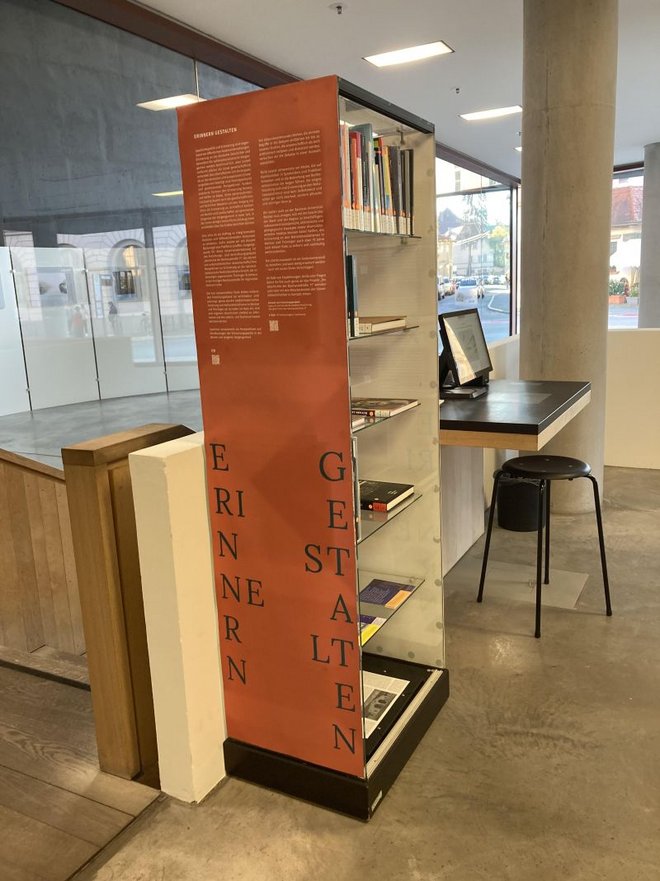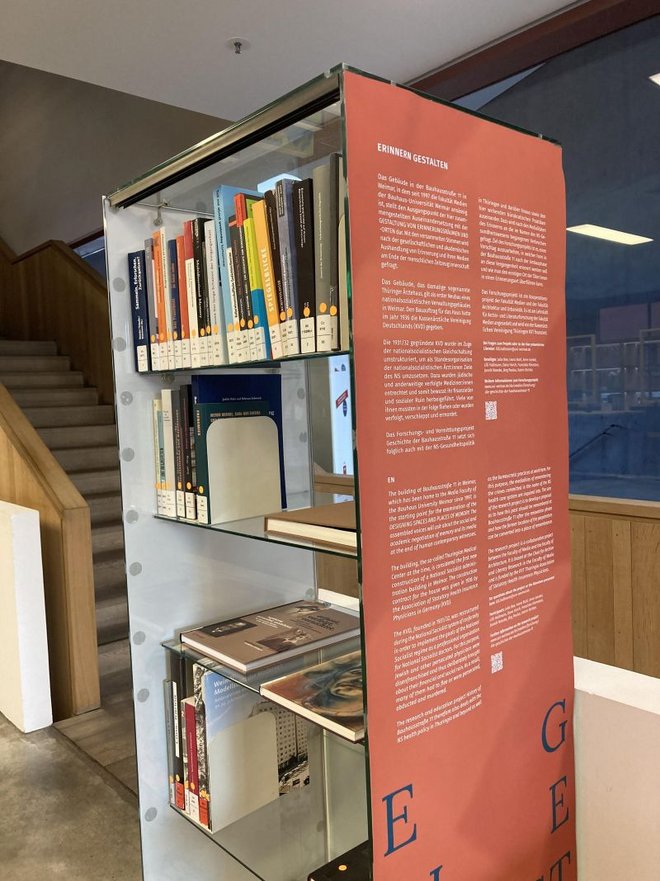Literatursammlung wechselt
Die in der Büchervitrine der UB Weimar versammelten Publikationen zum Thema Erinnern gestalten sind mit dem Ende des Sommersemesters 2023 in die normale Ausleihe zurückgegangen. Dass die hier zusammengetragene Literatur häufig frequentiert und ausgeliehen wurde, zeigt das große Interesse an der Thematik der Erinnerungsarbeit. Hierfür möchten wir uns ganz herzlich bedanken!
Die Vitrine ist ab sofort mit Publikationen zum Thema Klimaschutz und Nachhaltigkeit bestückt.
Hinweis auf weitere Ausstellungen in der UB Weimar
Wir freuen uns, dass das Literaturregal als Kooperation zwischen der Universitätsbibliothek und dem Forschungsprojekt zur Geschichte der Bauhausstraße 11 auch über das Wintersemester hinaus zugänglich ist.
In diesem Zusammenhang sei auf zwei thematisch verwandte Ausstellungen in der UB hingewiesen, die im März bzw. April 2023 eröffnet werden:
15.03, 17:00, oberes Foyer: Ausstellungseröffnung zum 60-jährigen Jubiläum der DEFA-Verfilmung von Nackt unter Wölfen (Regie: Frank Beyer).
03.04., 17:00, unteres Foyer: Ausstellungseröffnung Rosa Winkel. Als homosexuell verfolgte Häftlinge in den Konzentrationslagern Buchenwald und Mittelbau-Dora, mit Jens-Christian Wagner (Gedenkstätten Buchenwald und Mittelbau-Dora)
Die Vitrine ist eingeweiht :-)
Die Büchervitrine Erinnern gestalten, die Literatur zu den Themenfeldern Erinnern, Gedenken und NS-Medizinverbrechen versammelt, befindet sich ab sofort neben der Ausleitheke. Die Publikationen können wie üblich über den Selbstverbucher:innen-Schalter entliehen und über die Rückgabeklappe wieder abgegeben werden.
Besonders bedanken möchten wir uns bei Dana Horch (UB) und Johannes Ruhl (SCC) für die Unterstützung und Zusammenarbeit!
Bei Fragen, Kritik, Erwerbungsvorschlägen nehmt / nehmen Sie gerne Kontakt mit uns auf!
literature about DESIGNING SPACES AND PLACES OF MEMORY at university library
The politics of history and memory are the subject of public debate. Memories of German history and especially the National Socialist past are being discussed continuously, but perhaps more so than usual at the moment. In addition, the groups involved in the German and European discourse on remembrance are diversifying: post-migrant and post-colonial perspectives challenge established forms of remembrance and thus help to rethink them. At the same time, the social and professional debates about how to deal with places of remembrance continue. After all, we are left with buildings and landscapes as speaking testimonies of the past in a time when fewer and fewer contemporary witnesses can report directly on what they have experienced.
All of this is to be understood as an order for integrative approaches and differentiating discourses. We want to create a platform for this with this bookshelf. The starting point for this discussion is the research and mediation project “History of Bauhausstraße 11”, which is currently researching the memory of the National Socialist medical bureaucracy from different scientific perspectives, which had its regional center in the then so-called Thuringian medical center in today’s Bauhausstraße.
The texts collected here reflect the current state of research on architecture, planning and medical history on National Socialism in Weimar and Thuringia. They invite you to find out more about your own spatial environment and to get to know your place of living and studying better.
Second, they bring together perspectives on reinterpretations of the politics of memory in the older and more recent past. From discourse-determining works, which introduced key terms into the debate, to more recent studies, which are received and discussed scientifically and journalistically, we try to depict the debate in a selection.
Last but not least, we are bringing together works that point to continuities in symbolism and practices and thus highlight the threat posed by right-wing extremism. They show that research and remembrance of National Socialism are not an end in themselves and certainly not outdated, but are more topical and important than ever.
We also want to encourage the Bauhaus University Weimar to deal with the history of the city and the region. In particular, artistic, activist and educational concepts as well as diversity-sensitive approaches can help to secure the memory of National Socialism in Weimar and Thuringia more than 75 years after its end and to continue thinking about it in the long term.
The selection of literature is to be understood as food for thought and can be constantly expanded - also with your suggestions!
If you have any recommendations, criticism or questions, you are welcome to contact the project "The History of Bauhausstrasse 11" and/or get in touch with the staff of the University Library.
Contact to the research project:
www.uni-weimar.de/de/medien/forschung/die-geschichte-der-bauhausstrasse-11/
Email: lilli.hallmann@uni-weimar.de
Coming soon: Literatur-Regal "Erinnern gestalten" in der UB Weimar
Wir freuen uns, ankündigen zu können, dass in der Universitätsbibliothek der Bauhaus-Universität Weimar demnächst eine Büchervitrine unter dem Titel Erinnern gestalten Einzug finden wird.
Darin wird Literatur zusammengetragen, die sich der architektur- und planungs- genau wie der medizinhistorischen Forschung zum Nationalsozialismus in Weimar und Thüringen widmet. Auch Perspektiven auf Neudeutungen der Erinnerungspolitik in der älteren und jüngeren Vergangenheit sollen hiermit sichtbar gemacht werden.
Weitere Informationen folgen in Kürze!



